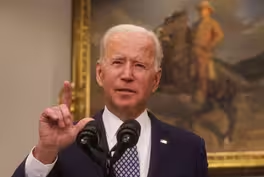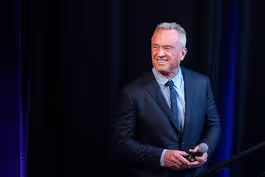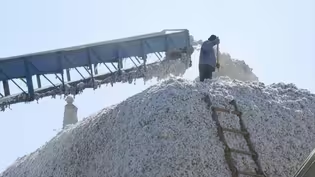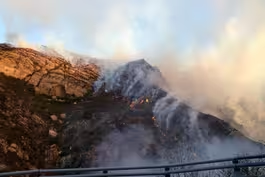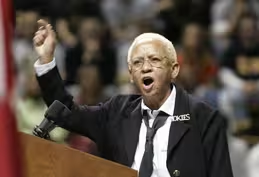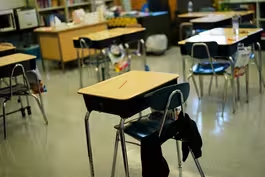
Syria's new leaders work to keep rebel factions united
Clip: 12/10/2024 | 6m 27sVideo has Closed Captions
Syria's new leaders work to keep rebel factions united after overthrow of common enemy
After 14 years of war, Syria is seeking stability. The country's caretaker prime minister, appointed by the fighters who overthrew Bashar al-Assad, said the government transition process is expected to last until March. Special correspondent Simona Foltyn reports from Damascus.
Problems playing video? | Closed Captioning Feedback
Problems playing video? | Closed Captioning Feedback
Major corporate funding for the PBS News Hour is provided by BDO, BNSF, Consumer Cellular, American Cruise Lines, and Raymond James. Funding for the PBS NewsHour Weekend is provided by...

Syria's new leaders work to keep rebel factions united
Clip: 12/10/2024 | 6m 27sVideo has Closed Captions
After 14 years of war, Syria is seeking stability. The country's caretaker prime minister, appointed by the fighters who overthrew Bashar al-Assad, said the government transition process is expected to last until March. Special correspondent Simona Foltyn reports from Damascus.
Problems playing video? | Closed Captioning Feedback
How to Watch PBS News Hour
PBS News Hour is available to stream on pbs.org and the free PBS App, available on iPhone, Apple TV, Android TV, Android smartphones, Amazon Fire TV, Amazon Fire Tablet, Roku, Samsung Smart TV, and Vizio.
Providing Support for PBS.org
Learn Moreabout PBS online sponsorshipGEOFF BENNETT: Welcome to the "News Hour."
After 14 years of war, Syria is seeking stability, beginning with a transition of power from the ousted Assad regime.
Today, the country's caretaker prime minister appointed by the fighters who overthrew Bashar al-Assad said the government transition process is expected to take until at least March.
AMNA NAWAZ: Meantime, the top U.S. general overseeing operations in the Middle East was in Syria today visiting American-backed Kurdish forces in Syria's northeast, who are under attack by Turkish-supported militia.
Special corresponded Simona Foltyn reports from Damascus.
SIMONA FOLTYN: The road to Damascus is littered with remnants of Assad's Syria.
When we crossed from Lebanon, the highway was still largely empty amid uncertainty over what's next.
In the capital, the embassy of Iran, once Assad's closest ally, sat abandoned, signaling a possible new balance of power in the region.
Syrians gathered at one of the main squares, once again daring to dream of a future.
There was jubilation among some, cautious optimism among others.
MAISA QADOOR, Syrian (through translator): I want Syria to go back to what it was, that there's no destruction, that we are one, that there's no sectarianism.
I'm against sectarianism.
I'm Syrian and you're Syrian and that's it.
SIMONA FOLTYN: After 13 years of uprisings and civil war, the armed opposition brought down Assad's government in a lightning offensive that lasted 11 days, but now an even bigger challenge lies ahead, forming a government that's acceptable to all Syrians.
Maisa, mother of three, has one demand for Syria's new rulers.
MAISA QADOOR (through translator): I want them to be just towards their people.
The people are exhausted from these last 15 years.
It's enough.
Let there be justice.
SIMONA FOLTYN: The prevailing feeling is hope that this is a turning point for the better.
Days after Bashar al-Assad's government was overthrown, there's still a festive mood here in Damascus' Umayyad Square.
People are out and about celebrating the end of decades of dictatorship.
But there's also a lot of uncertainty about what this next period will bring for Syria, as well as fear that the country could descend into another bout of violence.
Syria's opposition consisted of many competing factions.
And now that their common enemy is defeated, there's a risk they might turn on one another.
The tensions are palpable.
In the last few days, the American-backed Syrian Democratic forces, the SDF, extended their reach, capturing parts of the Eastern Deir el-Zour province and igniting a backlash.
Mahmoud Hamdan is from Deir el-Zour and wants the Kurdish-led SDF gone.
MAHMOUD HAMDAN, Syrian (through translator): SDF has no place in Deir el-Zour.
Deir el-Zour is for the people of Deir el-Zour and Syria only.
It's an Arab area.
We are not sectarian.
We aren't against the Shia or the Alawites or any sect, but we want our land.
The SDF is a separatist movement that wants to destroy Syria.
SIMONA FOLTYN: These men call on rebel leader Abu Mohammad al-Jolani to push the SDF out.
MAHMOUD HAMDAN (through translator): We demand the he Free Syrian Army to head towards Deir el-Zour.
We don't want war, but if we are forced, all these men will wear military fatigues and will march on Deir el-Zour.
Our job will not be complete unless there's complete liberation of Syria.
We want one state, one Syrian state only.
SIMONA FOLTYN: But who will rule this one Syria and how?
The leading rebel faction turned governing body is a Sunni-Islamist group called Hay'at Tahrir al-Sham, or HTS.
HTS used to be affiliated with al-Qaida, and many here are skeptical whether these men have shed their radical past.
HTS has taken control of the streets and administration buildings here.
This fighter who wouldn't give his full name told me that HTS is building an inclusive transitional government.
MUJAHID JABER, Armed Opposition Fighter (through translator): A Syrian is Syrian.
No matter his religion, Christian, Yazidi, Alawite, we are all the sons of this country.
Now we are providing security, and there's big acceptance and joy from the population.
And there's an understanding that this is a period of laying the foundations.
SIMONA FOLTYN: While uniting and governing Syria is one priority, protecting the country's sovereignty is a matter of urgency.
In Northern Syria, Turkish-backed forces are pushing into Kurdish areas, while Israel has taken control of Syrian territory to the west.
With Assad gone, the fight to oust him is over.
But a new struggle for Syria is already unfolding.
And, today, the Biden State Department issued a statement just six weeks before Donald Trump takes office again, saying that it would recognize a future Syrian government based on four criteria, respecting minority rights, allowing the free flow of humanitarian aid, preventing Syria from becoming a haven for terrorism, and finding and destroying biological and chemical weapons -- Amna.
AMNA NAWAZ: Simona, what kind of response have you seen from the regional powers when it comes to the overthrow of the Assad regime?
SIMONA FOLTYN: There is a sense here that regional powers are exploiting the power vacuum here in Damascus to pursue their own strategic interests.
On the one hand, Israel has been carrying out a heavy aerial bombardment campaign targeting more than 130 sites across Syria.
The objective of this campaign, Israel says, is to degrade Assad's military capabilities.
However, here, there is a concern that Israel is using this opportunity to weaken an Arab neighbor.
Also on the ground, Israel has occupied and taken control of a 155-square kilometer buffer zone next to the Golan Heights, raising fears of a potential occupation.
To the north, Turkey has also pursued its strategic interests with Turkish-backed militias attacking Kurdish towns.
We have seen today CENTCOM Commander General Kurilla visiting Northeastern Syria to try to reassure America's Kurdish allies.
But, overall, there is a lot of volatility, a lot of moving parts, and although Damascus appears pretty calm, it's clear that the regime change here is having ripple effects throughout the entire region.
AMNA NAWAZ: All right, that is Simona Foltyn reporting tonight from Damascus, Syria.
Simona, thank you.
Can Biden issue preemptive pardons to protect Trump critics?
Video has Closed Captions
Clip: 12/10/2024 | 6m 44s | Can Biden issue preemptive pardons to protect Trump critics from retribution? (6m 44s)
The controversial vaccine policy changes RFK Jr. could make
Video has Closed Captions
Clip: 12/10/2024 | 7m 59s | The controversial changes RFK Jr. could make to vaccine policy as HHS chief (7m 59s)
Cotton from Central Asia helps fuel Russia's war in Ukraine
Video has Closed Captions
Clip: 12/10/2024 | 8m 58s | How cotton from Central Asia is helping fuel Russia's war in Ukraine (8m 58s)
Investigators reveal possible motives in CEO killing
Video has Closed Captions
Clip: 12/10/2024 | 3m 34s | Investigators reveal clues to alleged gunman's possible motives in health care CEO killing (3m 34s)
News Wrap: Thousands ordered to evacuate Malibu wildfire
Video has Closed Captions
Clip: 12/10/2024 | 5m 30s | News Wrap: Thousands ordered to evacuate as wildfire burns near Malibu (5m 30s)
Remembering the fierce and lyrical voice of Nikki Giovanni
Video has Closed Captions
Clip: 12/10/2024 | 5m 7s | Remembering the fierce and lyrical voice of poet Nikki Giovanni (5m 7s)
Researchers report stunning surge of misogyny post-election
Video has Closed Captions
Clip: 12/10/2024 | 6m 51s | Researchers report stunning surge of misogyny post-election (6m 51s)
Providing Support for PBS.org
Learn Moreabout PBS online sponsorshipSupport for PBS provided by:
Major corporate funding for the PBS News Hour is provided by BDO, BNSF, Consumer Cellular, American Cruise Lines, and Raymond James. Funding for the PBS NewsHour Weekend is provided by...
